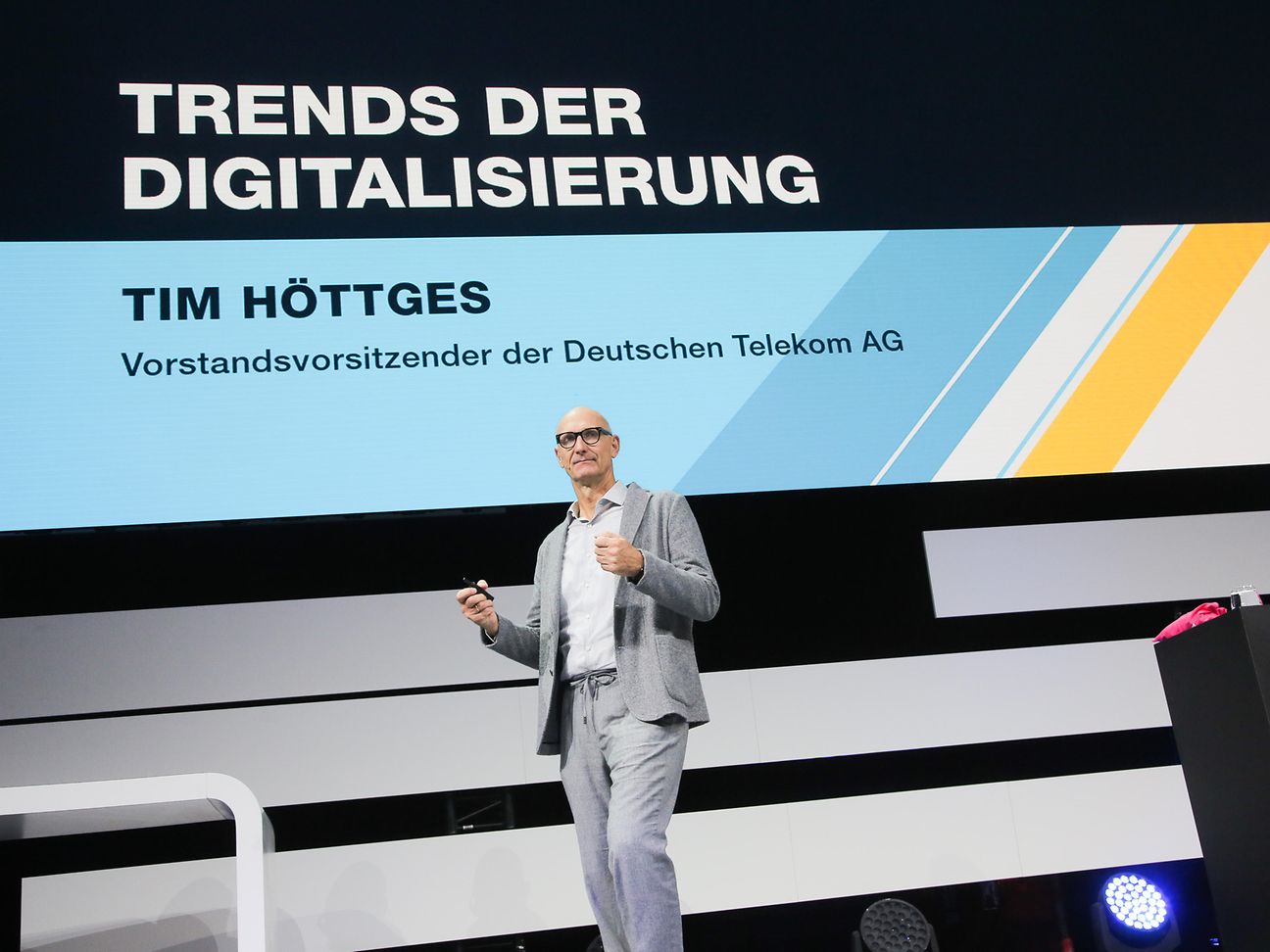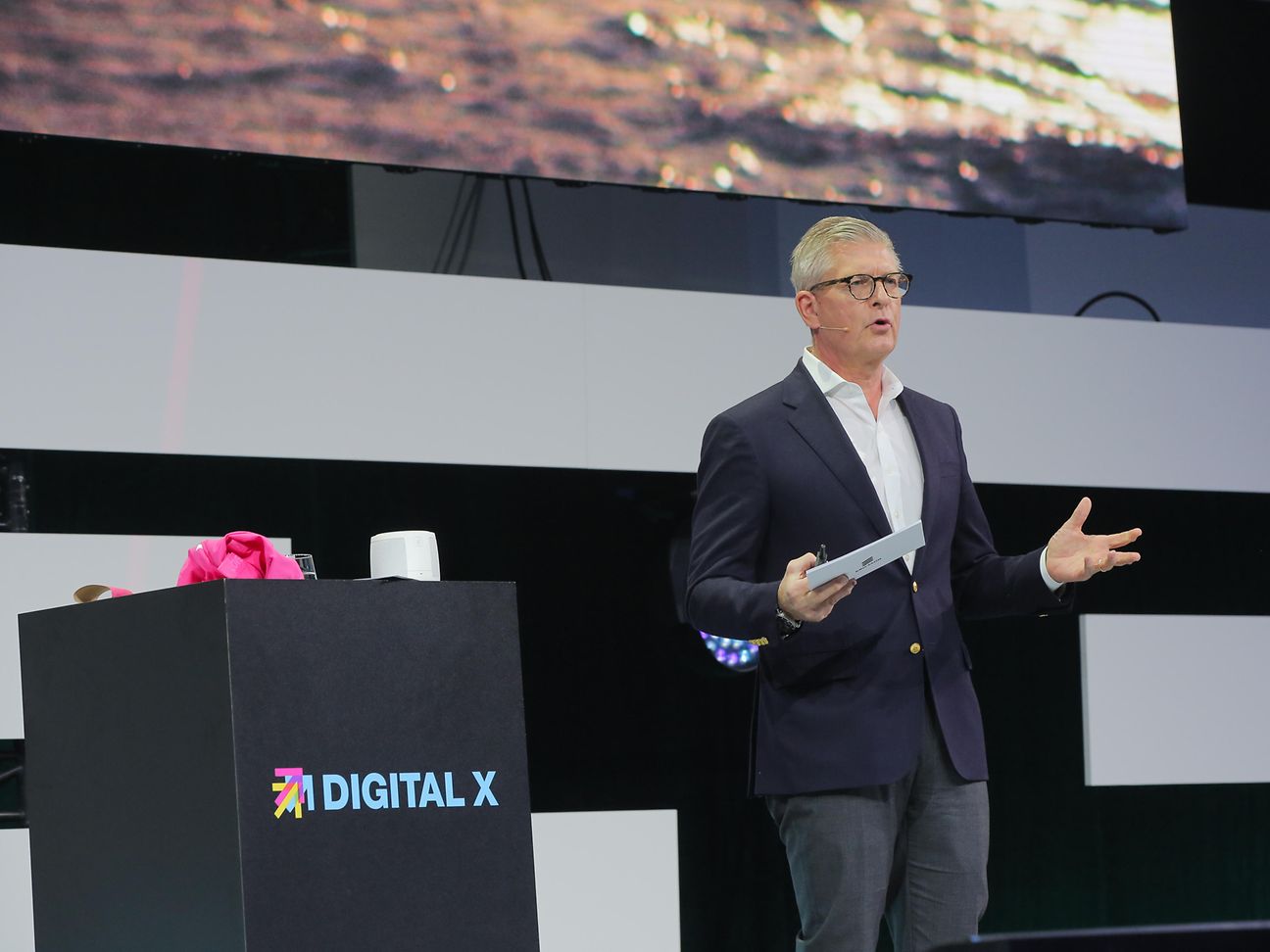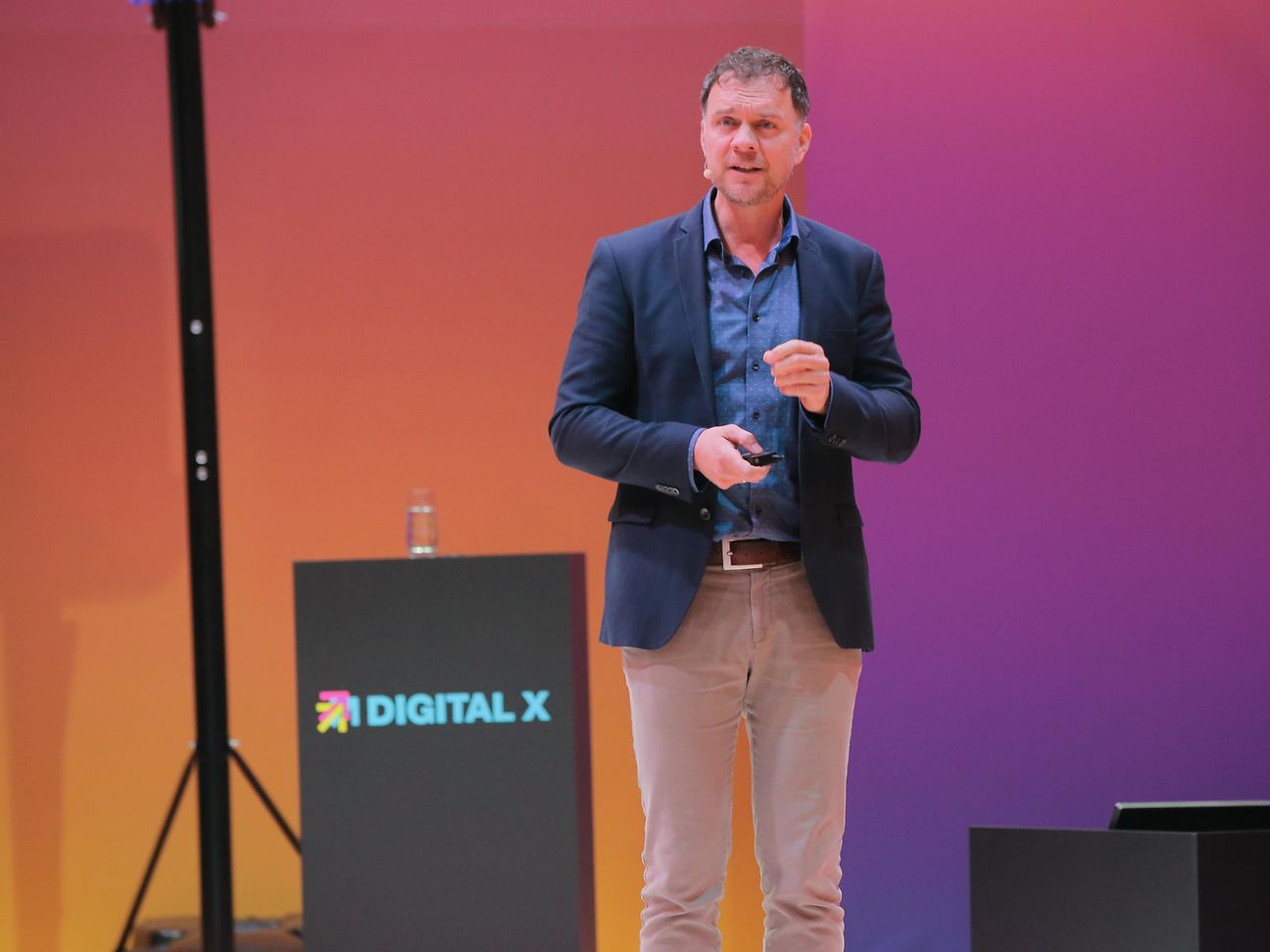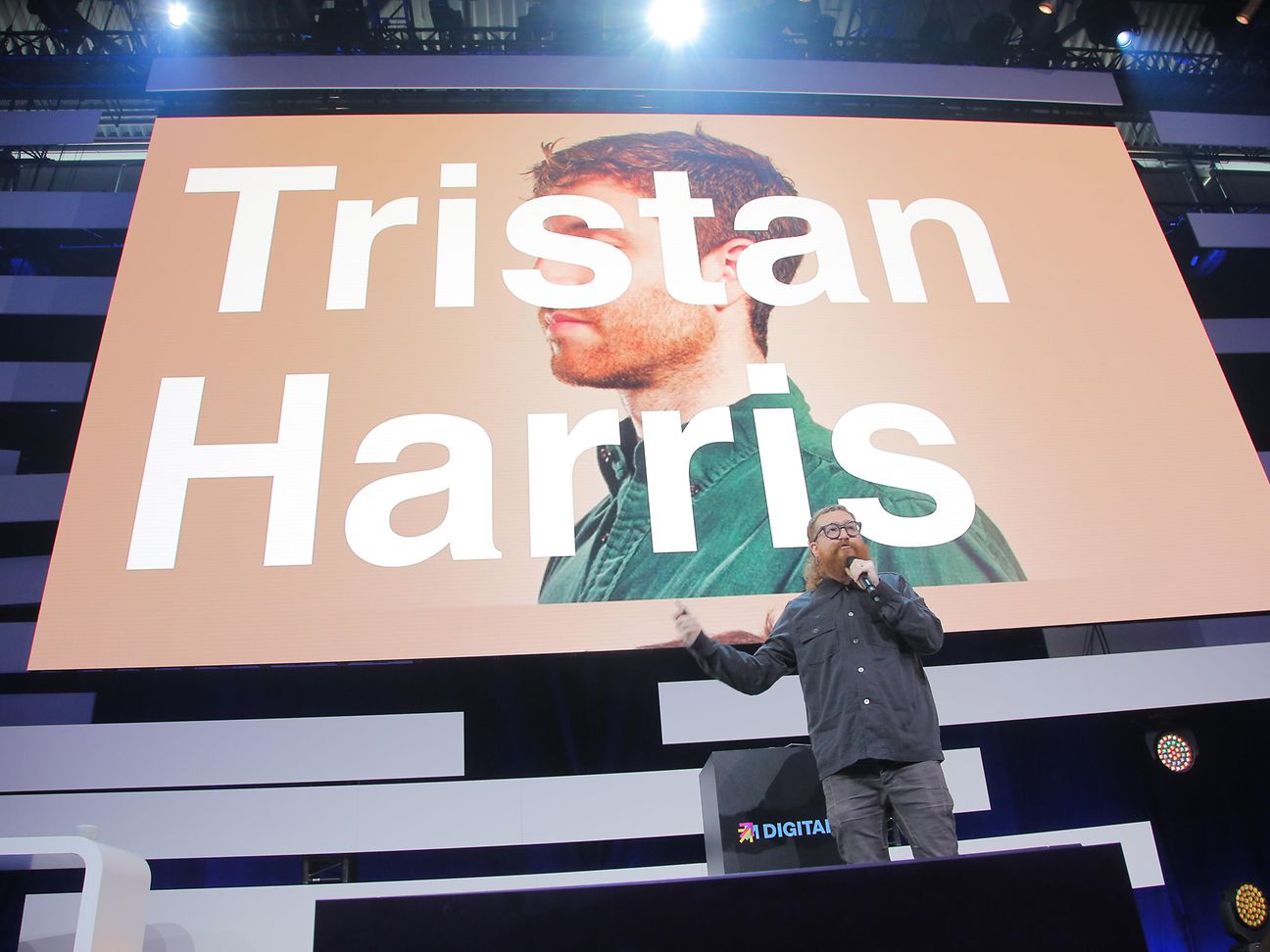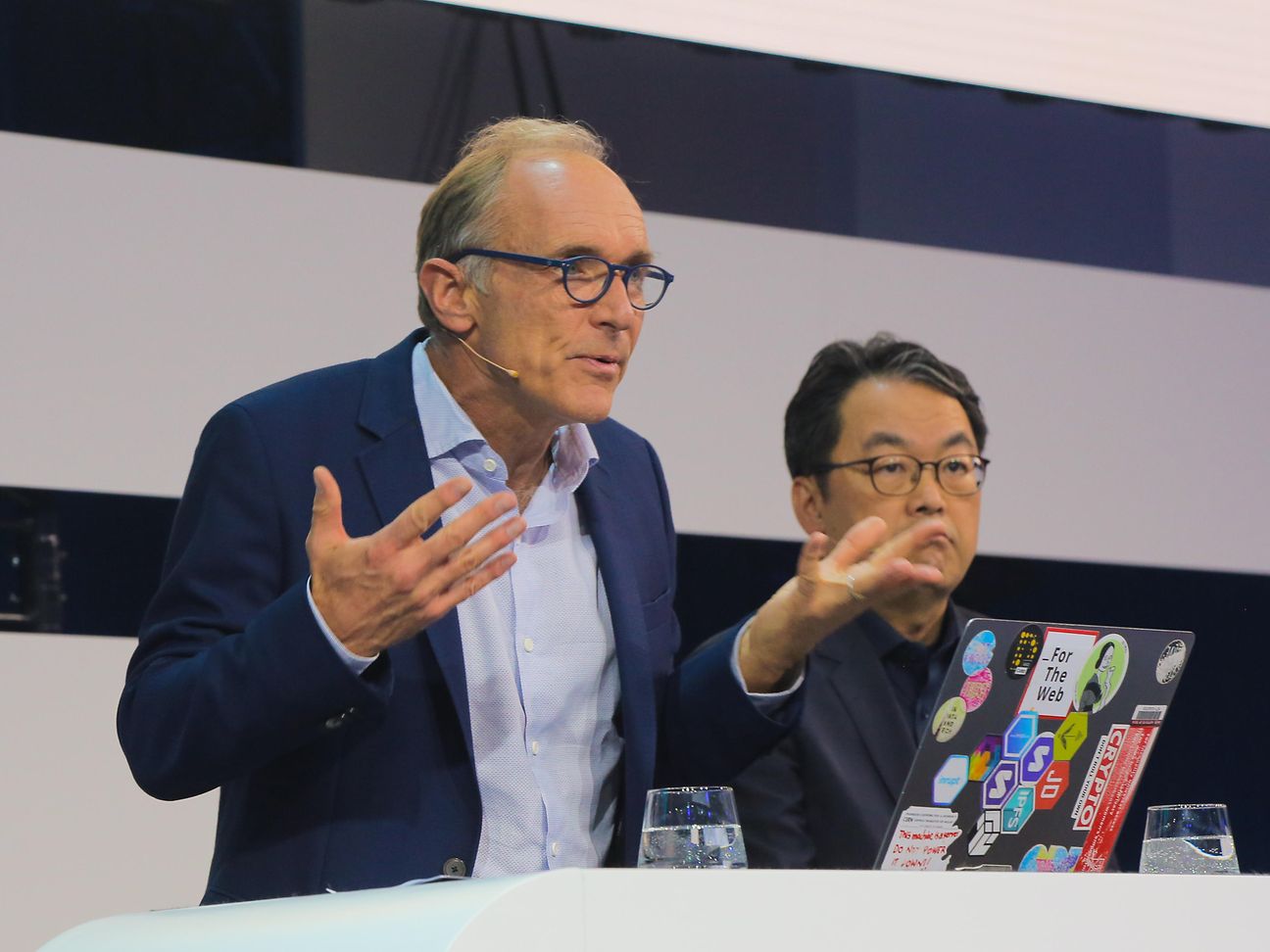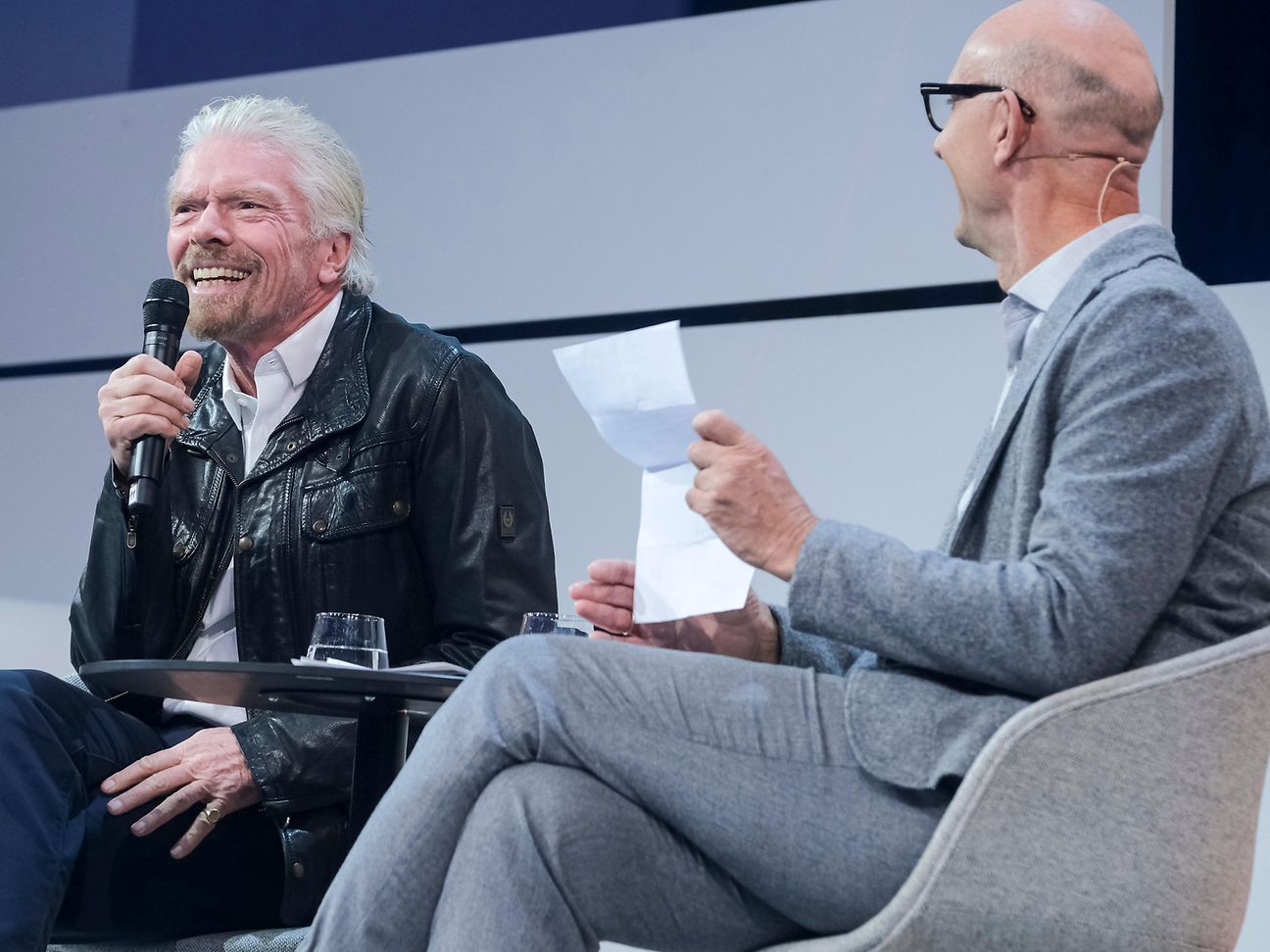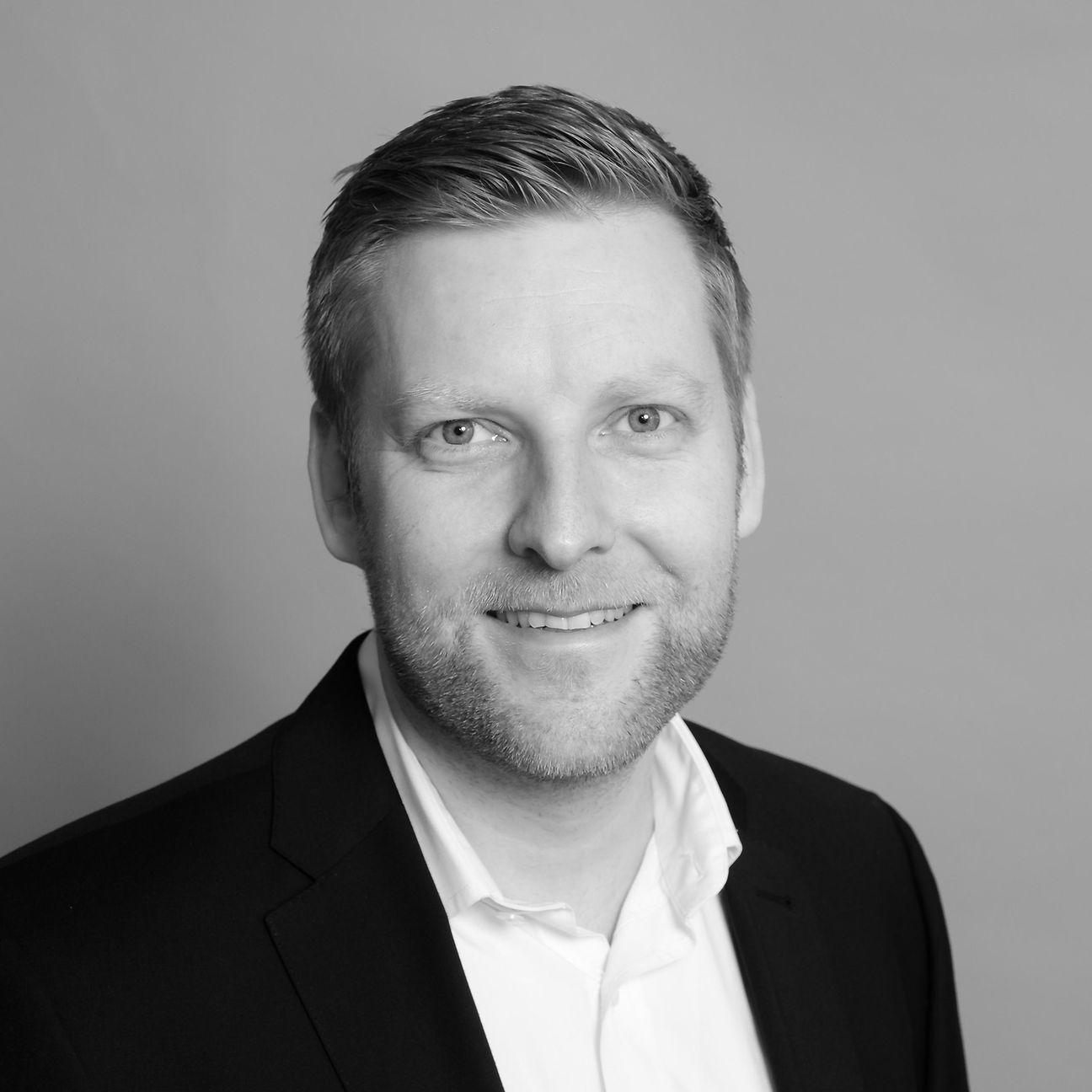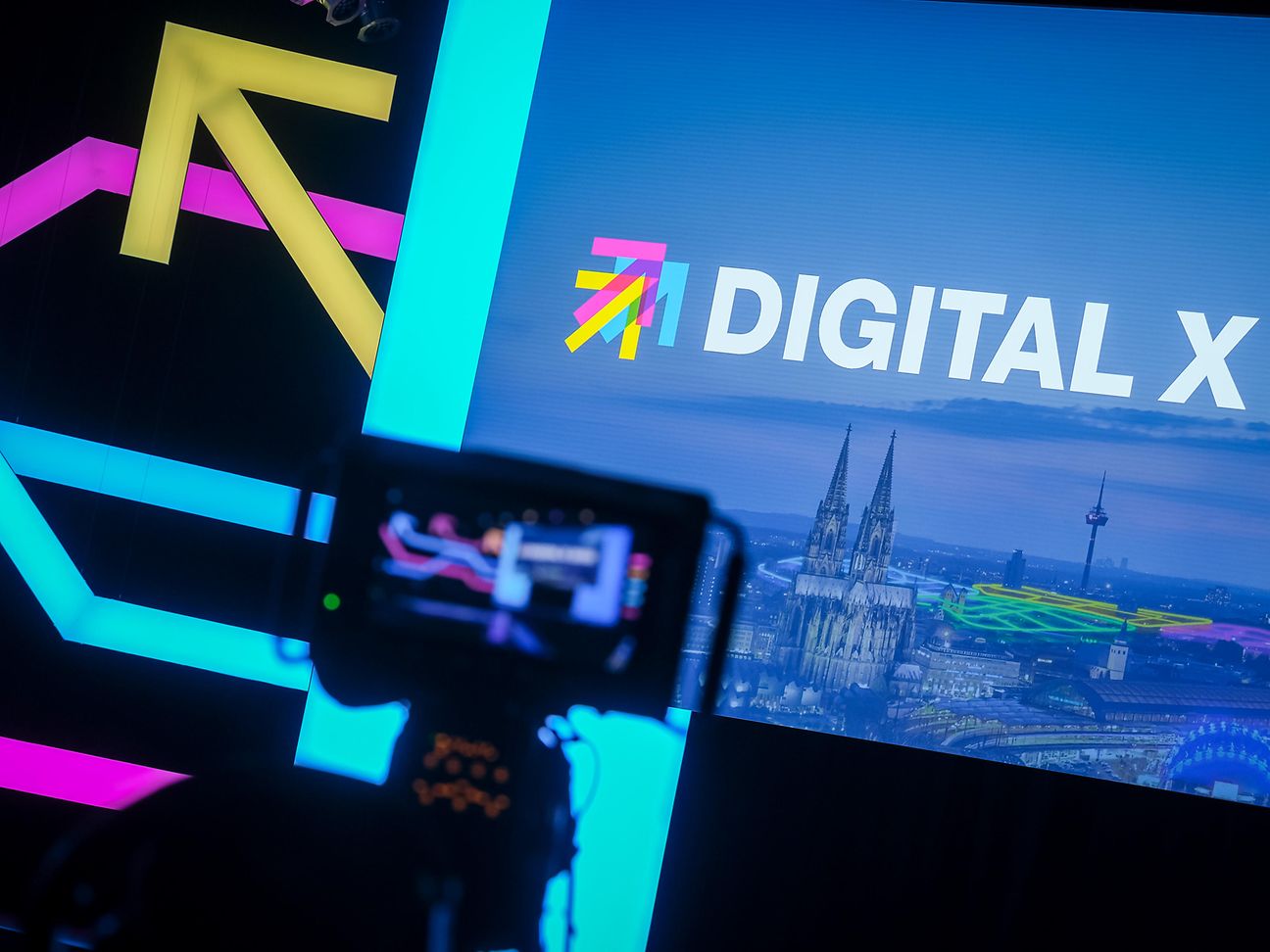

Digital X 2019: Welcome to the Grand Final in Cologne
20,000 square metres of exhibition space filled with thousands of decision-makers, customers, partners and other visitors. Five stages, from which a string of high-calibre names from the world of digitization will present, one after another. The latest innovations at your fingertips. All this awaits visitors over the next two days at the climax of DIGITAL X 2019 in Cologne. Of course, Telekom is there to fully #takepart.
DIGITAL X is Europe's leading digitization initiative. The 2019 grand finale will take place today and tomorrow, in Cologne once again.
Opening by patron Hagen Rickmann
Managing director for the business-customer division and patron of DIGITAL X, Hagen Rickmann, welcomes a sell-out crowd. At DIGITAL X, the industry's big players and numerous start-ups will present the latest innovations. In addition, partners and customers can expect a colourful programme over 20,000 square metres, with 160 speakers presenting from 5 stages. Last year, Hagen Rickmann had sleepless nights wondering whether the initiative would be a success. Now, the growing number of registrations from partners and visitors speak for themselves.
"We are only at the beginning of digitization," says Rickmann. "Telekom as the initiator, in cooperation with partners, is making the difference.
Tim Höttges "Trends of Digitalization"
"We are in the middle of a trade war between China and the USA," said CEO Tim Höttges at the beginning of his keynote speech. This is not primarily about punitive tariffs, but rather about who will become the world’s technological leader in the future. A glance at the list of the world's 40 largest tech companies shows: "Europe is on the sidelines for this question". For this reason, Höttges outlined various approaches in his presentation to better position Europe in the digital market. "First of all, we must improve the framework conditions for investments," said Höttges. This includes a labour market policy that promotes SMEs. The same goes for the possibility of establishing European companies that can keep pace with the tech giants from America and Asia. In addition, the Telekom CEO emphasized the importance of digital sovereignty in Europe. "I expressly support a shared European cloud infrastructure."
Another ingredient for a successful European digital policy is the promotion of leapfrog innovations. "To this end, we need more tax incentives for research and development. We must support young companies with public funds and free them from bureaucracy". Last but not least, Höttges stressed that it is particularly important today to work for integrity in the digital space. "Our world and what we have achieved cannot be taken for granted. We must stand up for our values". Part of this, for example, is the development of new methods for uncovering fake news. In addition to numerous disruptions such as the blockchain, artificial intelligence and quantum computers, one premise always remains the same in the changing digital market: the customer comes first. "This is the trick to making companies successful."
Börje Ekholm, Ericsson CEO – "5G powered business"
Börje Ekholm provided some interesting insights on the subject of 5G. How does one of the leading technology groups and network suppliers look at the future communication standard? "5G takes digitization to a new level. That's the good news. The bad: While other countries are already ultra-fast in this area, we in Europe are fixating on costs," says Ekholm. We need a consistent 5G policy for Europe and a sense of its value. Turning to the audience, Ekholm talked about 5G applications that you can't even think about today. And they would probably not be developed by Ericsson or by Telekom, but by those attending the event from industry.
Making innovations possible. Quality high, costs down. That's what 5G is all about. Augmented reality glasses in production. Robots without cables that communicate via 5G. Just two examples from industry that create significantly more flexibility and lower costs. According to Ekholm, 5G provides the perfect conditions for this. "With 5G, the decisive factor is not necessarily the speed of the data transmission - but the low delay and the density of devices that can communicate with each other. Get started! 5G has arrived," he told the audience.
“Head or stomach - Better decisions in the digital age", is Volker Busch’s new title
He is a neuroscientist and specialist in psychiatry and psychotherapy. His conviction: Not every decision that a person makes is intelligent. It is a fallacy to believe that the more information we have, the better our decisions will be, says Busch. The reason: "Once a critical amount of data has been reached, our brain stop processing it. It’s designed to think in patterns, to simplify, to allocate." Where man is superior to machines and thus to artificial intelligence, is in the area of causality, i.e. assigning meaning to information and establishing meaningful connections. Machines and algorithms cannot do that.
His example brought a laugh from the audience: the search engine Google recognizes a pattern between the amount of ice cream consumed and sunburn - as if one caused the other. In fact, hot summers are the cause of both. Busch argued for not believing religiously in technology and for trusting your own life experiences instead. "Each of you has an incredible treasure, an experience library. These books of everyday life also help you as an entrepreneur to make decisions." One could also call this gut feeling, or intuition. These can’t be allowed to waste away. Busch continued: "The more we outsource technology and believe in data, the more we surrender our expertise. That’s a real cause for concern.
Since Inuit populations began planning routes and organizing their everyday lives with mobile communications some 20 years ago, there have been significantly more accidents there. The knowledge of how to behave in everyday life, which had been passed down from generation to generation, is disappearing rapidly." Busch finished with a take-home message for the audience: Data and information are becoming increasingly important. But thinking should remain with people. "Do we have to use apps for every little thing in everyday life?" he asks. His answer: "Expertise is born out of experience. Let's not be afraid of intuition. Man is more than mere information. And we should be teaching that in our schools, and to our apprentices."
Harper Reed: The impact of digital technology on business
What is Artificial Intelligence? For IT specialist Harper Reed, the answer is simple: "AI is Magic". Because like a magic trick, even big tech companies sometimes don't know how their algorithms work. This creates fears. Studies have even shown that algorithms can be error-prone – with fatal results. For example, when face and person recognition fails because of skin colour.
"We are not quite there yet", concluded Reed. A solution? Enrich data quality with more diversity. Because artificial intelligence is only as good as the data with which the software is trained. Users should also be more careful with what they want from AI. "AI does exactly what we tell it to do," Reed said. The software doesn't think outside the box. In order for the result not to be "killer vacuum cleaner robot", the order must be carefully formulated for the software. Ethical concerns must also always be taken into account during development.
Chris Boos: Germany needs an innovation-welcoming culture
"We have no reason to believe that the development of artificial intelligence is progressing slowly," warns Chris Boos. The computer scientist admits that it would take several hundred years before an intelligent machine equal to humans could ever be developed. Nevertheless, AI is "the greatest opportunity that has existed in the last 500 years".
Chris Boos explains: "Machines do not understand anything. But they are good at comparing things. In order to make use of this ability, AI is dependent on data, because: "Experience is the raw material of AI. AI is about taking our experiences are multiplying them. But the storage of data should not just be a means to an end. Data storage must be linked to a specific purpose. Today, people have the opportunity to decide what the AI applications of the future should be. And the answer cannot just be making an existing process "two percent better". Optimization is not the standard we should be aspiring to, rather we should "use the data to create something new!". Boos wants the audience to embrace a higher-risk culture. "Please, do something!" he shouts.
Tim Berners-Lee (Inventor of html & Founder of the World Wide Web): "The Future of Web”
The World Wide Web celebrates its 30th birthday this year. Fittingly for this important anniversary, Sir Tim Berners-Lee was on hand to contribute at Digital X. Berners-Lee invented the World Wide Web in 1989, laying the foundation for a technology that has changed our lives like no other. “At first, we reached web speeds of 300 bits per second,” explained Berners-Lee. “Since then, the WWW has become around a million times faster - no other technology has managed that.” In addition, around half of the world’s population is now online. According to the scientist, this evolution brings with it new challenges. “Trust in internet sources is declining due to the manipulation of opinions, fake news, and bots.” Another field of work is data protection. “We have to give people back control over their data," explained Berners-Lee, delivering a possible solution at the same time: His current research project "Solid" aims to improve the privacy of internet users and protect their data.
Hagen Rickmann: Data Analytics is the next step
"I am convinced that digitization has arrived at the German Mittelstand," says Hagen Rickmann, Managing Director of the business-customer division. 51 percent of German companies have now have digitization firmly anchored in their business strategy and are wondering how they can use it to further enhance the customer experience. Stepping things up further will rely on a foundation of data and facts. This is the key to success. "The treasure trove of data is already there," says Rickmann. By 2018, we had already collected 33 Zettabytes of data. 88 percent of it is lying around unused, with two or three copies. The data must be analysed, skilfully evaluated and combined - "we can do this automatically thanks to new technologies such as 5G, massive computing power, digital touchpoints, and many more. We at Telekom will do this going forward, together with our partner teradata". As part of their strategic partnership, teradata and Telekom Deutschland will be launching the first Data Analytics solution for German SMEs next year: the Digital Sales Assistant. This is Data Analytics as a service - standardized, but individually tailored to the needs of the company. "I am sure," says Rickmann, "that the combination of entrepreneurial flair, our quality German engineering, and the right Data Analytics solution will make every company even more successful. So: Data Analytics is the next step, get started!”
Minister of State Dorothee Bär represented Chancellor Merkel
Dorothee Bär visited Digital X after the Digital Summit in Dortmund – she spoke positively of the two events: "We need more events like this, not just in the big cities". The Digital X trade fair is an "excellent platform" for exchange between entrepreneurs and for dialogue on digitization.
Dialogue is particularly important as diffuse fears of technological developments often hinder progress. Bär emphasised that it was time to shake up the tried and tested. Silos should be broken open, also in thinking. At Digital X, she noticed a new spirit of optimism. "We must succeed in bringing this optimistic momentum to the whole population," said Bär.
Sir Richard Branson talking to Tim Höttges
And then there was Sir Richard Branson. In a conversation with Tim Höttges, the entrepreneur gave the visitors a detailed insight into the activities of the Virgin Group. Branson started the group in 1970 with the music label Virgin Records. He now operates numerous entertainment and travel companies under the brand. He also does not stop at space. "I've waited a long time for the established space companies to build a spacecraft people like me can travel with." But since that has not happened yet, Branson decided to take the issue into his own hands and founded Virgin Galactic. "With this, we want to lower the barrier for people to travel into space." The entrepreneur is also working on the Virgin Hyperloop - a high-speed line in India that will travel up to 1,000 miles per hour. Sustainability plays a decisive role in all of this. "We're focusing on fighting climate change," says the 69-year-old. But protecting the climate must not stop companies. Rather, it must lead to the development of climate-friendly technologies. His appeal: "We must transform the world into a clean world as quickly as possible". In response to Tim Höttges' final question "what his advice is for managers and his recipe for success", Branson replied: "Look for the best in everyone. Encounter everyone friendly. Work hand in hand, not against each other."

